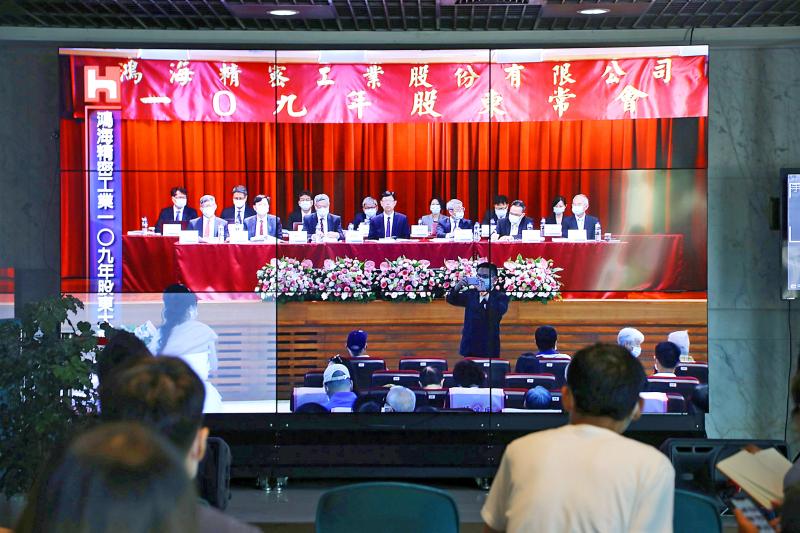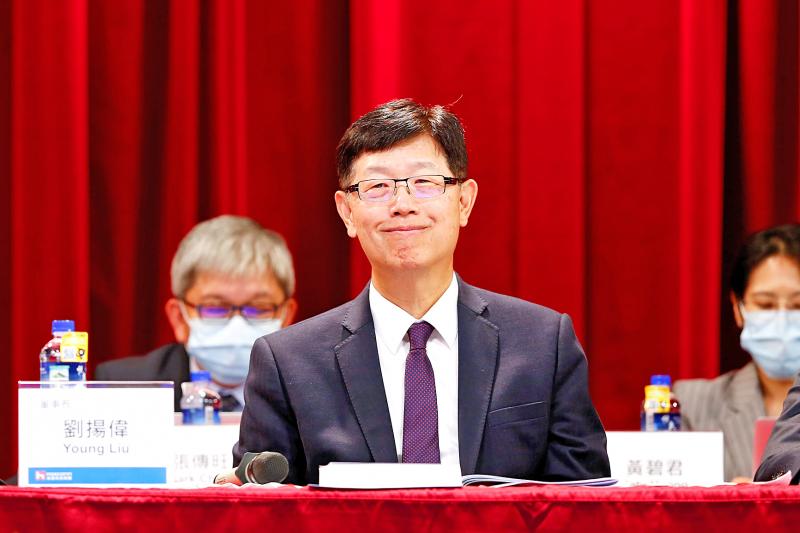Hon Hai Precision Industry Co (鴻海), Apple Inc’s largest iPhone assembler, has mapped out a five-year plan to drive growth for the company, chairman Young Liu (劉揚偉) told shareholders at an annual general meeting in New Taipei City yesterday.
Highlighting a three-step plan revolving around digital transformation, Liu said the company is focused on developing three core technologies: artificial intelligence, semiconductors and new-generation communication.
“To improve our profit margin, we have set our sights on three new industries: electric vehicles, digital healthcare and robotics,” Liu said.

Photo: Reuters / Ann Wang
Upon succeeding Hon Hai founder Terry Gou (郭台銘) as chairman last year, Liu has vowed to increase the company’s gross margin from about 6 percent to 10 percent within five years.
“With a compound annual growth rate of more than 20 percent ... output value from these industries are estimated to reach US$1.4 trillion by 2025,” Liu said, expressing the hope to claim up to 10 percent of market share.
Pointing to saturation in the information and communications technology industry, Liu said that the company would see little growth if it focuses only on its main assembling business.

Photo: Bloomberg / Ashley Pon
Heavily reliant on Apple’s orders of iPhones, which are mostly still assembled at its China plants, Hon Hai has witnessed an 89.49 percent drop in net profit for last quarter due to the COVID-19 pandemic.
The company has trimmed its outlook for this year following a dampened smartphone market.
Liu said Hon Hai is cutting down on management and operational costs to recover from losses.
Hon Hai’s shareholders approved a plan to distribute a cash dividend of NT$4.2 per common share.
Liu said that the company would hold a technology forum in about October to showcase new developments by the company’s research institute, which comprises five centers specializing in artificial intelligence, semiconductors, next-generation communications, cybersecurity and quantum computing.

TAKING STOCK: A Taiwanese cookware firm in Vietnam urged customers to assess inventory or place orders early so shipments can reach the US while tariffs are paused Taiwanese businesses in Vietnam are exploring alternatives after the White House imposed a 46 percent import duty on Vietnamese goods, following US President Donald Trump’s announcement of “reciprocal” tariffs on the US’ trading partners. Lo Shih-liang (羅世良), chairman of Brico Industry Co (裕茂工業), a Taiwanese company that manufactures cast iron cookware and stove components in Vietnam, said that more than 40 percent of his business was tied to the US market, describing the constant US policy shifts as an emotional roller coaster. “I work during the day and stay up all night watching the news. I’ve been following US news until 3am

UNCERTAINTY: Innolux activated a stringent supply chain management mechanism, as it did during the COVID-19 pandemic, to ensure optimal inventory levels for customers Flat-panel display makers AUO Corp (友達) and Innolux Corp (群創) yesterday said that about 12 to 20 percent of their display business is at risk of potential US tariffs and that they would relocate production or shipment destinations to mitigate the levies’ effects. US tariffs would have a direct impact of US$200 million on AUO’s revenue, company chairman Paul Peng (彭雙浪) told reporters on the sidelines of the Touch Taiwan trade show in Taipei yesterday. That would make up about 12 percent of the company’s overall revenue. To cope with the tariff uncertainty, AUO plans to allocate its production to manufacturing facilities in

Six years ago, LVMH’s billionaire CEO Bernard Arnault and US President Donald Trump cut the blue ribbon on a factory in rural Texas that would make designer handbags for Louis Vuitton, one of the world’s best-known luxury brands. However, since the high-profile opening, the factory has faced a host of problems limiting production, 11 former Louis Vuitton employees said. The site has consistently ranked among the worst-performing for Louis Vuitton globally, “significantly” underperforming other facilities, said three former Louis Vuitton workers and a senior industry source, who cited internal rankings shared with staff. The plant’s problems — which have not

COLLABORATION: Given Taiwan’s key position in global supply chains, the US firm is discussing strategies with local partners and clients to deal with global uncertainties Advanced Micro Devices Inc (AMD) yesterday said it is meeting with local ecosystem partners, including Taiwan Semiconductor Manufacturing Co (TSMC, 台積電), to discuss strategies, including long-term manufacturing, to navigate uncertainties such as US tariffs, as Taiwan occupies an important position in global supply chains. AMD chief executive officer Lisa Su (蘇姿丰) told reporters that Taiwan is an important part of the chip designer’s ecosystem and she is discussing with partners and customers in Taiwan to forge strong collaborations on different areas during this critical period. AMD has just become the first artificial-intelligence (AI) server chip customer of TSMC to utilize its advanced